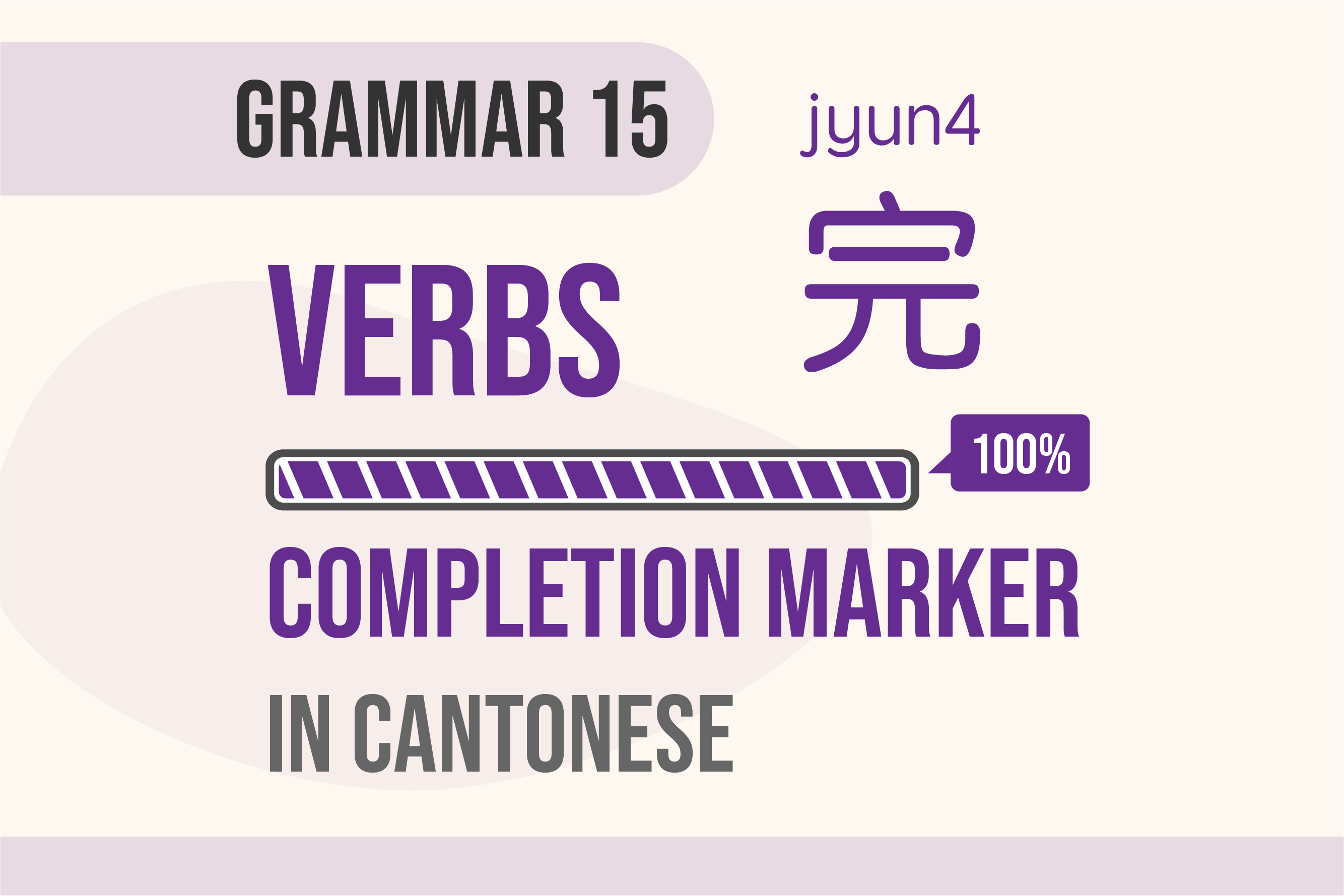Table of Content
In Cantonese, the marker 完 is used after a verb to indicate the completion of an action. Similarly, in Mandarin, 完 also signals that an action has been completed. It literally means "finished" and is often translated that way. This marker can apply to actions in the present, past, or future, with the context and supporting words determining the time frame.
完 can sometimes be interchangeable with 埋 or 晒, which also function as completion markers. We'll explain the nuances in future lessons.
Question
①【Subject - verb - 完 - (obj./n.) - 未 - 呀】? (to ask)
②【Subject - 係唔係 - verb - 完 - (obj./n.) - 啦】? (to confirm)
Refer to Grammar01 - 係(hai6) for the meaning of 係唔係
Structure ① is a general way of asking someone if an action is completed, while Structure ② is typically used when you want to confirm that the action is indeed completed.
① 你做完功課未呀?
② 你係唔係做完功課啦?
Have you finished (doing) your homework yet?
① 你用完廁所未呀?
② 你係唔係用完廁所啦?
Are you done using the bathroom?
(lit. Have you finished using the bathroom yet?)① 你食完飯未呀?
② 你係唔係食完飯啦?
Are you done with your meal?
(lit. Have you finished eating yet?)① 你考慮完未呀?
② 你係唔係考慮完啦?
Have you made up your mind yet?
(lit. Have you finished considering it yet?)
Single-Character Verb
Transitive Verb
(+ve)【Subject - verb - 完 - Object】
(-ve)【Subject - 未 - verb - 完 - Object】
做完功課先可以打機
Finish your homework, only then you can play video games .
(lit. Finish doing your homework…)你未做完功課,所以唔可以打機
You have not finished your homework, so you cannot play video games.
(lit. You have not finished doing homework ...)我睇完呢本書啦
I have finished reading this book.我未睇完呢本書呀
I have not finished reading this book.(睇 - to see. It conveys the meaning of "to read" only when there's a direct object, which is a publications or reading materials. )
Verbs with Complementing Noun
(+ve)【Subject - verb - 完 - complementing noun】
(-ve)【Subject - 未 - verb - 完 - complementing noun】
Refer to Grammar08 - Cantonese Verbs for more about complementing noun.
(Present Perfect)
我食完飯啦
I’m done.
(lit. I've finished eating.)我未食完飯呀
I have not finished (eating).(Future Perfect)
我差唔多去食飯,我食完飯再搵你啦
I'm about to go eat. I'll get back to you after I'm done.
(lit. ..., will find you again (after) I finished eating )(Past Perfect)
我尋晚食完飯之後去咗跑步
Last night, I went for a run after dinner.
(lit. Last night, I went for a run after I had finished eating.)
Double-Character Verbs
You may refer to Grammar08 - Cantonese Verbs for more about the definition of double-character verbs, separable verbs and non-separable verbs.
【Subject - [Separable Double-Character Verb] 】
Separable Double-Character Verb usually has a [Verb-Noun] structure
(+ve)【Subject - [Verb - 完 - Noun]】
(-ve)【Subject - 未 - [Verb - 完 - Noun]】
Separable Verbs
我沖完涼啦,到你沖啦
I’m done with my shower. It’s your turn now.
(lit. I have finished taking shower, ...)我未沖完涼呀,唔好入嚟住
I’m not done with my shower. Don't come in yet.
(lit. I have not finished taking shower, ...)
Non-separable Verbs
(+ve)【Subject - [Non-separable Double-Character Verb] - 完 】
(-ve)【Subject - 未 - [Non-separable Double-Character Verb] - 完 】
我考慮完再搵你啦
I'll get back to you after I have made up my mind.
(lit. I will find you again (when) I finished considering.)
